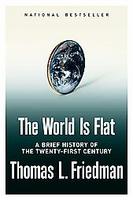
Paradigm Shift: From Command & Control to Connect & Collaborate
In "The World Is Flat", Thomas Friedman tells us that globalization has three phases: the first from 1492 to around 1800, in which countries and governments opened up trade with the New World and which was driven by military expansion and the amount of horse-power and wind power countries could employ; the second from 1800 to 2000, in which global integration was driven by multinational corporations, steam engines, and railways; and the third, in which individuals are the driving force and the defining technology is a worldwide fiber-optic network. In each of these phases Friedman notes that technology is the driving force and that globalization is a byproduct of that technology. Friedman notes that one cannot fight technology and therefore neither can one fight the resulting flatism.
But, how did the world `become flat'? Friedman lists ten trigger events:
1. 11/9/89 - when the Berlin Wall fell and unleashed forces that liberated the captive peoples of the Soviet Empire and tipped the balance of power away from authoritarian rule.
2. 8/9/95 - when Netscape went public and made it possible for the world to be interconnected.
3. Work Flow Software
4. Open-Sourcing
5. Outsourcing
6. Offshoring
7. Supply-Chaining
8. Insourcing
9. In-forming - Google, Yahoo!, MSN Web Search and other products make almost all information available worldwide.
10. The Steroids - digital, mobile, personal, and virtual devices that make it possible to connect to the Internet from almost anywhere.
He goes on to recommend a policy of "compassionate flatism" that consists of several prongs:
1. Leadership - Here Friedman is at his most idealistic, recommending the transformation of politicians into people that are willing to level with their constituents that there is no fighting flatism, but instead are willing to lead and inspire.
2. Replacing fat with muscles - This refers from transforming from lifetime employment as the ideal to lifetime employability. He recommends a series of actions government can take to help enable people to this goal in the realm of portability of pensions and healthcare.
3. Immigration - Friedman believes that immigration of the best and brightest from other countries is essential to America keeping up with the rest of the world. The author favors an immigration policy that gives a five year work visa to any foreign student who completes a Ph.D. at an accredited American university in any subject.
4. Parenting - Finally, Friedman implores parents to practice "tough love" with their kids and tell them when it is time to turn off the game boys and open up the books. He rightfully points out the sense of entitlement that American kids feel today.
It will be interesting to see if America is up to the challenge of facing a flat world, since our economic future will depend on it.





No comments:
Post a Comment